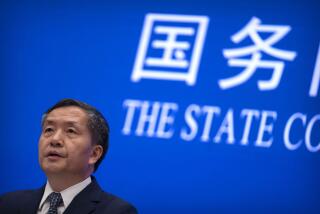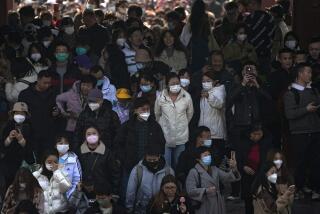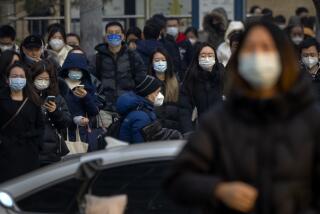Efforts to contain the coronavirus outbreak a test of China’s centralized control
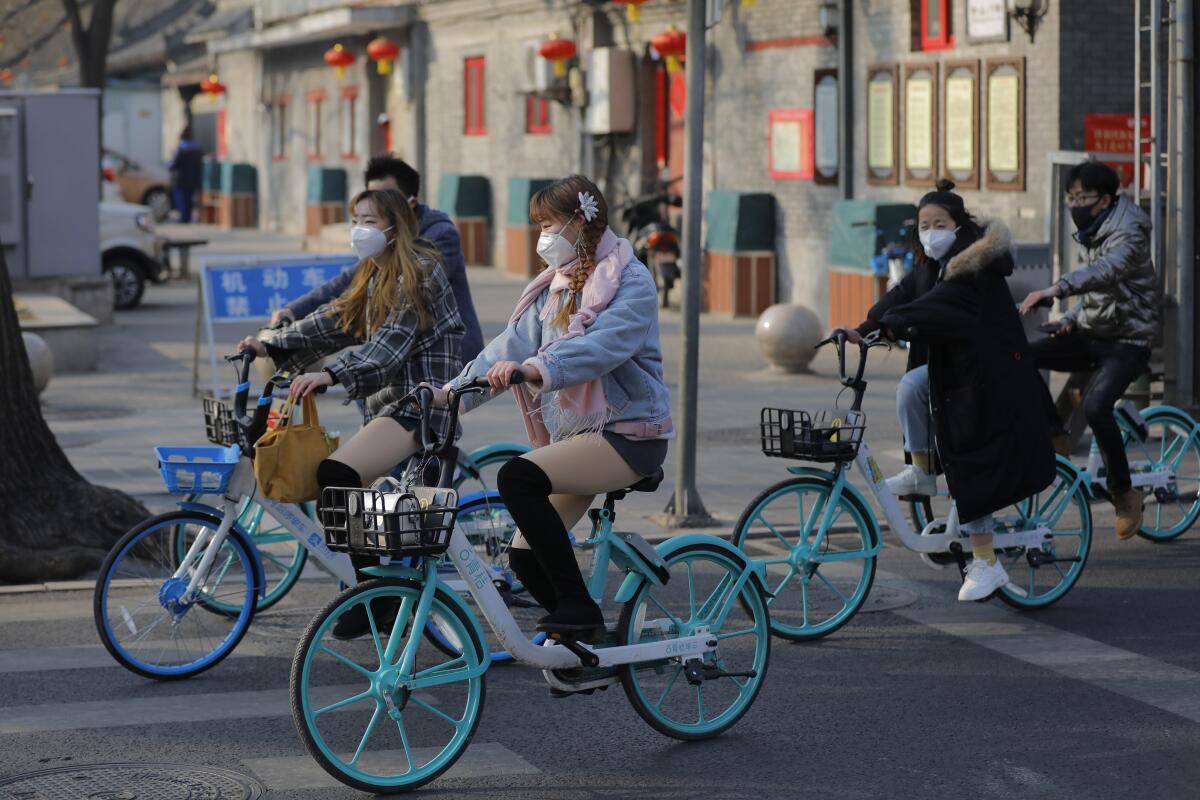
Chinese authorities sent a clear message to the public Monday: Local officials in Wuhan city and Hubei province were to blame for the government’s slow response to the coronavirus that has killed more than 80 people, infected more than 2,700 people in China, and spread to 15 other countries or territories.
In an indication China’s leadership was moving to deflect and temper public outrage, the mayor of Wuhan, Zhou Xianwang, said on state television Monday evening that he and Wuhan’s Communist Party secretary had not responded well to the outbreak and were willing to resign if necessary.
The outbreak is a critical test for President Xi Jinping, offering insights into how Beijing’s central authority works — or doesn’t work — in times of alarm. Chinese social media usually censor criticism of government officials. But angry posts blaming Wuhan officials’ ineptitude and dishonesty for exacerbating the coronavirus outbreak have been allowed to come to a boil online, a strategic ploy by the central government to find a scapegoat.
Meanwhile, the central government has taken over the outbreak response, appointing Premier Li Keqiang head of a new leadership group tasked with virus control and dispatching him to the epicenter in Wuhan. State media broadcast videos of Li rallying the public in grocery stores, clinics and a hospital construction site Monday.
“The entire nation’s people are watching you!” Li spoke to a group of nurses and doctors from behind a face mask, pumping his fist.
“Add oil!” they chanted back, repeating a Chinese phrase of encouragement.
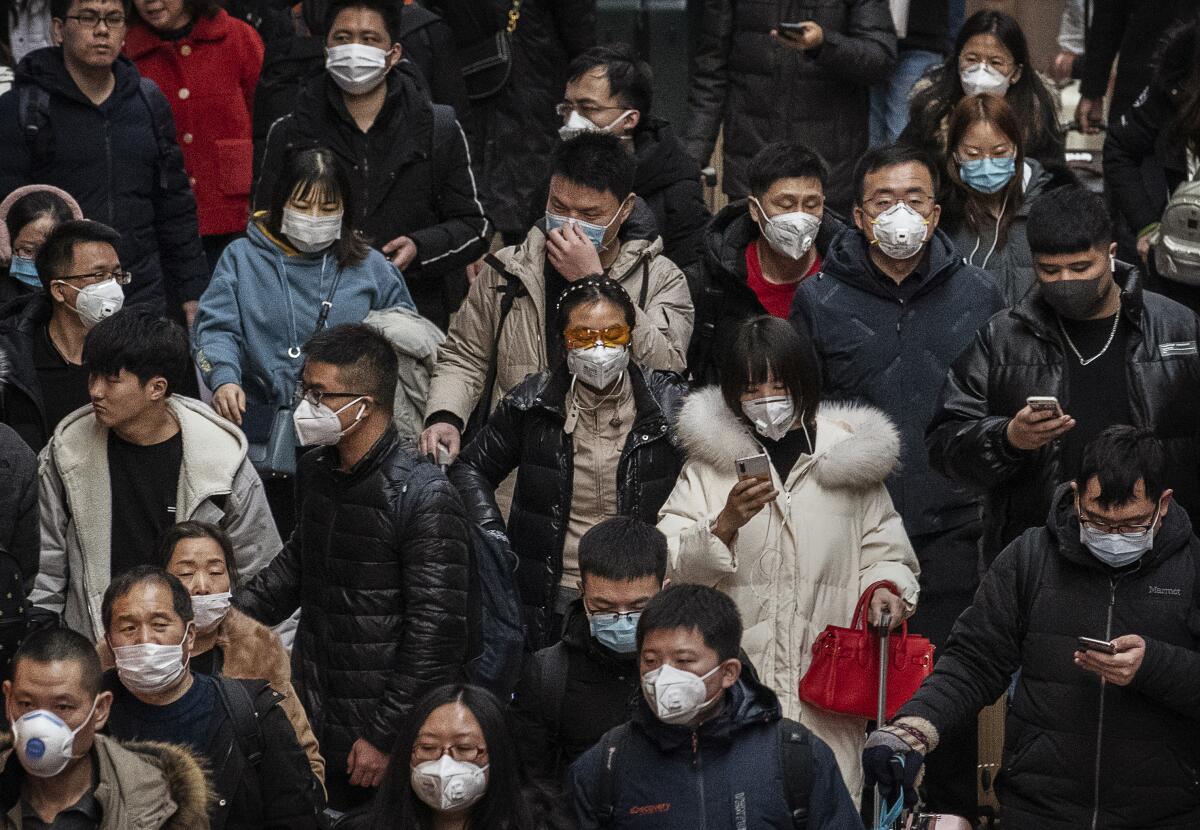
Beijing’s takeover of the virus response is a test of and window into the Communist Party’s style of governance. With China’s strong centralized control come mass mobilization and authority that would be unthinkable anywhere else. But that top-down grip also creates inertia that allows containable problems to flare into crises that demand wider action.
Seventeen Chinese cities, home to more than 50 million people, have been put under lockdown, residents blocked from traveling during the Lunar New Year, the nation’s biggest migration period.
“It’s unprecedented in modern Chinese history,” said Yanzhong Huang, senior fellow for global health at the Council on Foreign Relations. “Only a very authoritarian government with strong centralized leadership can make and implement that decision.”
China has ordered travel agencies to cancel all tours, while governments including Hong Kong, Malaysia and Taiwan are banning entry of Chinese citizens from Wuhan.
Chinese authorities extended the Lunar New Year holiday nationwide to Sunday, canceling school and work, while individual cities further prolonged the duration of the holiday. Workers in Wuhan are building new hospitals to house quarantined patients in a matter of days, with state media livestreaming the construction online.
This massive response, however, obscures the fact that China’s authoritarian system is what led to the local lack of reporting on the deadly virus in the first place.
Although China’s ability to research and quickly sequence the new virus has improved since the 2003 SARS outbreak, little has changed in terms of government transparency, which is what matters when it comes to prevention and control of infectious diseases, Huang said.
Part of that opacity is purely bureaucratic. Local officials can’t release information about a confirmed new coronavirus until they get verification from the city, then from the county, then all the way up to the central disease control center, Huang said, calling the process “onerous.”
Another part of it is political. Local officials are rewarded for performance, which often translates into them concealing problems rather than exposing and solving them. Willy Lam, professor of China studies at the Chinese University of Hong Kong, said that provincial officials’ reluctance to disclose “embarrassing or negative developments” in their areas of governance is “long-standing Chinese political culture.”
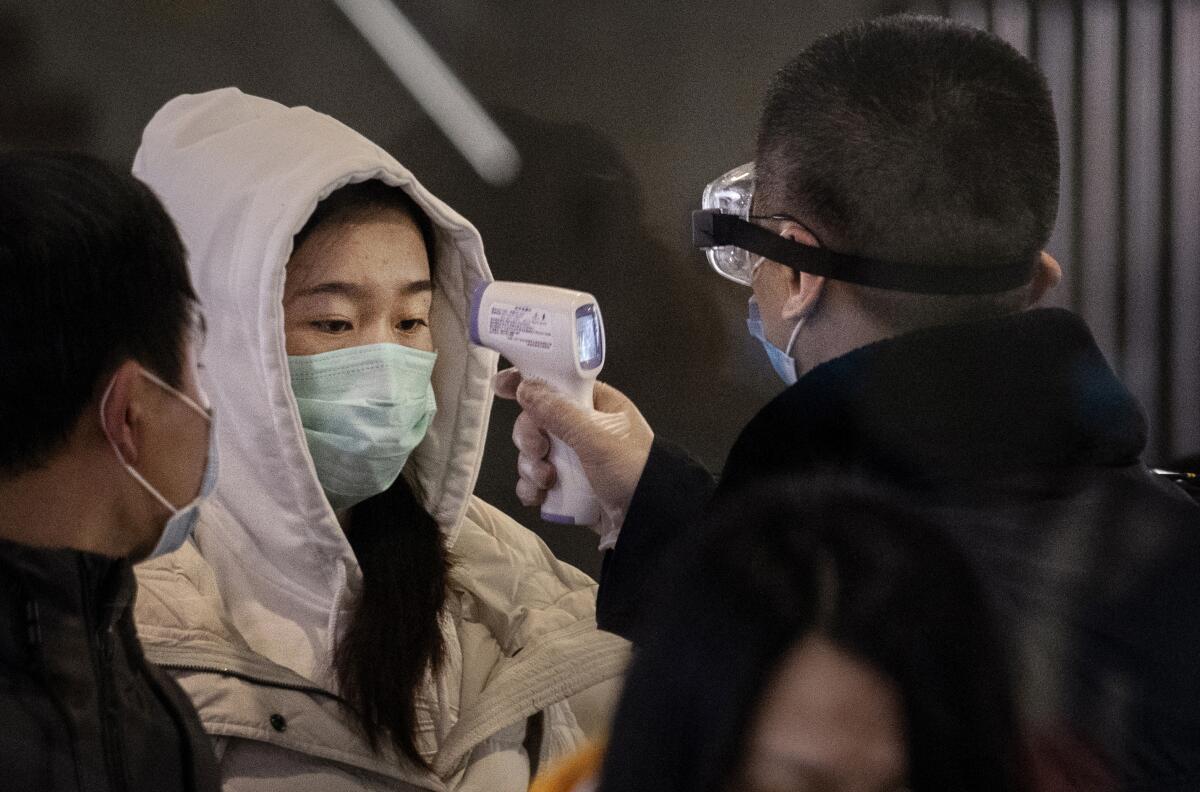
A lack of free press or any other forms of accountability and the concentration of power through the Communist Party further offer an incentive to local officials to “maintain stability” by silencing those who speak up about social issues, rather than addressing the issues themselves.
That performance of stability may have been why Wuhan authorities allowed 40,000 families to proceed with a Lunar New Year banquet last week despite knowing about dozens of coronavirus cases. Days before the city went on lockdown, local authorities gave away 200,000 free event coupons in hopes of bringing in more tourists during the holiday.
Officials’ behavior began to change only last week, when Xi issued an order that the virus must be “resolutely contained” and that Communist Party cadres must prioritize “the safety of people’s lives and their physical health.”
“Both Xi Jinping and Li Keqiang have said that local officials would be penalized for hiding facts, for not doing enough,” Lam said. “But the subtext of that message was to ask the people to blame local authorities instead of Beijing — when actually, the ultimate responsibility rests with the central authorities.”
Beijing is complicit in the delayed response, Lam said, because central authorities perpetuate the political culture and because they almost certainly knew of the high coronavirus infection rate in other provinces, but chose not to divulge it.
“They were not as ignorant as they made themselves out to be,” Lam said.
Morale seems to have improved in some parts of Wuhan since the central government’s takeover and Li’s visit. Videos circulated on social media Monday evening of Wuhan residents cheering, “Add oil!” and singing the national anthem together from their apartment windows.
But nationalistic enthusiasm isn’t a containment strategy, and experts say the Wuhan quarantine may have come too late to contain the coronavirus.
Zhou, the Wuhan mayor, announced Sunday night that 5 million Wuhan residents had left the city before Thursday’s lockdown.
China and governments worldwide are now scrambling to find and quarantine or deport many of those travelers.
Countries including the United States, France, Japan and Sri Lanka are evacuating citizens from Wuhan, and the head of the World Health Organization, which decided last week not to declare the coronavirus outbreak a global public health emergency, is traveling to Beijing to reassess the situation.
A top Chinese health official said Friday that the coronavirus is contagious during its incubation period, meaning people can spread the virus before they demonstrate symptoms of being sick.
On Sunday, scientists at the University of Hong Kong mapping the coronavirus outbreak said at a news briefing that as many as 44,000 people may be infected, far higher than the official numbers, in light of the fact that people may be infectious without showing symptoms.
Gabriel Leung, head of the university team, said the virus is likely to create “epicenters of self-sustaining epidemics” in Beijing, Shanghai, Chongqing, Shenzhen and Guangzhou, and to spread farther from there, given the megacities’ roles as regional and international transport hubs.
“We have to be prepared that this particular epidemic may be about to become a global epidemic,” Leung said.
Failure to control the disease would come at a cost for China’s leadership and for the world, said Dali Yang, professor of political science at the University of Chicago.
The Communist Party has built a reputation on its ability to “concentrate resources to get things done — and big things done,” he said. “I hope they will rise to the occasion, because the consequences are not just for China.”
Staff writer Cindy Chang contributed to this report.
More to Read
Start your day right
Sign up for Essential California for news, features and recommendations from the L.A. Times and beyond in your inbox six days a week.
You may occasionally receive promotional content from the Los Angeles Times.
